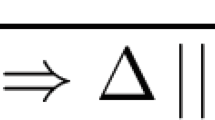Abstract
We present a new logic-based approach to the reasoning about knowledge which is independent of possible worlds semantics. \({\in_K}\) (Epsilon-K) is a non-Fregean logic whose models consist of propositional universes with subsets for true, false and known propositions. Knowledge is, in general, not closed under rules of inference; the only valid epistemic principles are the knowledge axiom K i φ → φ and some minimal conditions concerning common knowledge in a group. Knowledge is explicit and all forms of the logical omniscience problem are avoided. Various stronger epistemic properties such as positive and/or negative introspection, the K-axiom, closure under logical connectives, etc. can be restored by imposing additional semantic constraints. This yields corresponding sublogics for which we present sound and complete axiomatizations. As a useful tool for general model constructions we study abstract versions of some 3-valued logics in which we interpret truth as knowledge. We establish a connection between \({\in_K}\) and the well-known syntactic approach to explicit knowledge proving a result concerning equi-expressiveness. Furthermore, we discuss some self-referential epistemic statements, such as the knower paradox, as relaxations of variants of the liar paradox and show how these epistemic “paradoxes” can be solved in \({\in_K}\). Every specific \({\in_K}\)-logic is defined as a certain extension of some underlying classical abstract logic.
Similar content being viewed by others
References
Barwise J., Etchemendy J.: The Liar. Oxford University Press, New York, Oxford (1987)
Bloom S.L., Brown D.J.: ‘Classical Abstract Logics’. Dissertationes Mathematicae 102, 43–51 (1973)
Bloom S.L., Suszko R.: ‘Investigation into the Sentential Calculus with Identity’. Notre Dame Journal of Formal Logic 13, 289–308 (1972)
Brown D.J., Suszko R.: ‘Abstract Logics’. Dissertationes Mathematicae 102, 9–42 (1973)
Fagin R., Halpern J.Y., Moses Y., Vardi M.Y.: Reasoning about Knowledge. MIT Press, Cambridge, Mass. (2003)
Fitting M.: ‘A Logic of Explicit Knowledge’. In: Behounek, L., Bilkova, M. (eds) The Logica Yearbook 2004, pp. 11–22. Filosofia, Prague (2005)
Halpern, J., and R. Pucella, ‘Dealing with logical omniscience’, DOI:10.1145/1324249.1324273. TARK ’07 Proceedings of the 11th Conference on Theoretical aspects of rationality and knowledge, ACM New York, NY, USA, 2007.
Lewitzka, S., ‘\({\in_T\,(\Sigma)}\)-Logik: Eine Erweiterung der Prädikatenlogik erster Stufe mit Selbstreferenz und totalemWahrheitsprädikat’, Diplomarbeit, Technische Universität Berlin, 1998.
Lewitzka S.: ‘Abstract Logics, Logic Maps and Logic Homomorphisms’. Logica Universalis 1, 243–276 (2007)
Lewitzka, S., ‘\({\in_4}\): A 4-valued truth theory and meta-logic’, preprint, 2007.
Lewitzka S.: ‘\({\in_I}\): An intuitionistic logic without Fregean Axiom and with predicates for truth and falsity’. Notre Dame Journal of Formal Logic 50, 275–301 (2009)
Lewitzka S., Brunner A.B.M.: ‘Minimally generated abstract logics’. Logica Universalis 3, 219–241 (2009)
Meyer, J. J. Ch., and W. van der Hoeck, Epistemic Logic for AI and Computer Science, Cambridge Tracts in Theoretical Computer Science 41, Cambridge University Press 1995.
Robering, K., ‘Logics with Propositional Quantifiers and Propositional Identity’, in S. Bab and K. Robering (eds.), Judgements and Propositions. Logical, Linguistic, and Cognitive Issues, Logische Philosophie, Bd. 21, Logos Verlag, Berlin, 2010.
Sträter, W., ‘\({\in_T}\) Eine Logik erster Stufe mit Selbstreferenz und totalem Wahrheitsprädikat’, KIT-Report 98, Technische Universität Berlin, 1992.
Suszko R.: ‘Non-Fregean Logic and Theories’, Analele Universitatii Bucuresti. Acta Logica 11, 105–125 (1968)
Suszko, R., ‘Abolition of the Fregean Axiom’, in R. Parikh (ed.), Logic Colloquium, Lecture Notes in Mathematics 453:169–239, Springer-Verlag, 1975.
Suszko R.: ‘The Fregean axiom and Polish mathematical logic in the 1920s’. Studia Logica 36, 373–380 (1977)
Wansing H.: ‘A general possible worlds framework for reasoning about knowledge and belief’. Studia Logica 49, 523–539 (1990)
Zeitz, P., Parametrisierte \({\in_T}\)-Logik – eine Theorie der Erweiterung abstrakter Logiken um die Konzepte Wahrheit, Referenz und klassische Negation, Dissertation, Logos Verlag Berlin, 2000.
Author information
Authors and Affiliations
Corresponding author
Rights and permissions
About this article
Cite this article
Lewitzka, S. \({\in_K}\): a Non-Fregean Logic of Explicit Knowledge. Stud Logica 97, 233–264 (2011). https://doi.org/10.1007/s11225-011-9304-8
Received:
Published:
Issue Date:
DOI: https://doi.org/10.1007/s11225-011-9304-8



